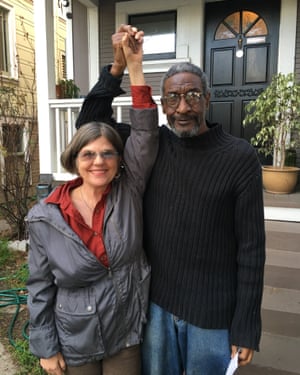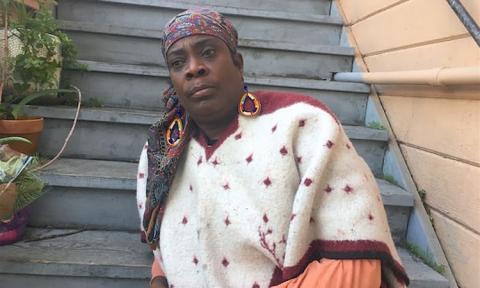She Fought for her Community as a Black Panther. Will Gentrification Force Her Out?
One by one, Frances Moore has watched friends and neighbors move into cars, tents and encampments. Many in crisis often turn to the 62-year-old Oakland woman, who provides free meals to the homeless, but she has found it increasingly difficult to hear their stories of displacement.
That’s because she knows she could soon be next.
Moore, known locally as Aunti Frances, is now fighting an eviction from the community where she was born and raised, in the heart of a neighborhood recently named the hottest real estate market in the US. In north Oakland, a region strained by the wealth of Silicon Valley and a major affordable housing shortage, the former Black Panther’s struggle has become a rallying cry in the battle against gentrification.
“I have to think about my program, the community I’ve given so much to, my blood, sweat and tears. It’s about more than just me,” Moore said on a recent afternoon, seated on the stoop outside her second-storey apartment. She sighed and buried her face in her hands: “I’m just panicked.”
The displacement of low-income communities of color has become a predictable cycle of life in the San Francisco Bay Area in recent years amid a booming tech industry and rising income inequality. Real estate investors and tech landlords have launched mass evictions to make way for Facebook employees and have increasingly removed elderly and dying tenants from their longtime homes.
Like many older black tenants in the region, Moore is at the mercy of a young landlord who bought her home and immediately moved to kick her out.
Growing up in Oakland and Berkeley, known internationally for civil rights activism, Moore said she first learned of the Black Panthers at around age 12 and that the group eventually took her in when she aged out of foster care.
As a teenager, Moore sang with a Black Panther group and worked for the civil rights group, which was founded in Oakland and provided health clinics and free meals: “They took me in and fostered me, fostered my growth. I learned and practiced and worked, and I mean worked, like 15 hours a day.”
She moved into her current apartment in 2010, not far from where she grew up and launched the Self-Help Hunger Program to provide meals to locals and homeless people.
The program has persisted in the face of backlash from newer residents who complained about homeless people and garbage and harassment by police.
Most recently, Moore’s biggest challenge is Natalia Morphy, a 31-year-old woman who bought the three-apartment complex where Moore lives and has repeatedly tried to evict the tenant. Though the previous attempts have failed, Morphy, who co-owns the property with her parents, is now arguing in court that she lives in one of the units and thus has a right to remove the remaining tenants.
Leah Simon-Weisberg, Moore’s lawyer, said there was no reason Morphy had to force Moore out: “She’s giving a notice that says, ‘You can’t be my neighbor.’”
The community I’ve given so much to, my blood, sweat and tears. It’s about more than just me
Through her attorney, Daniel Cheung, Morphy did not respond to requests for comment.
“Though our client is certainly empathetic to Ms Moore, she is confident that her right to recover possession is proper, legal and ethical,” Cheung said in an email, adding, “Natalia is an honest, hard working young woman who painstakingly saved her earnings to purchase her property, which she intends to use to build her nest. She has lived and worked in Oakland and South Berkeley for many years and is just as much of a valuable member to the Oakland community as Ms Moore.”
Moore said the eviction has taken a toll on her, causing panic attacks and sleepless nights: “I want to turn my brain off.” To her new landlord, Moore added: “I haven’t even shaken your hand. You don’t even know whose lives you are ejecting from this community.”
Morphy’s legal strategy exploits what tenants’ rights groups say is a major loophole in the law, allowing landlords to bypass renters’ protections by claiming they are moving in to one of the units. In historically black neighborhoods, many homes are vulnerable to this tactic, which allows investors to evict long-time residents and flip the properties for profit.

Heidi Borst, a 60-year-old tenant also facing eviction, with close friend and domestic partner Charles Branklyn.
Simon-Weisberg said she has seen a sharp increase in these kinds of evictions – sometimes from young white landlords in their 20s who purchase properties with their parents’ help. In Oakland, where she is managing attorney for the tenants’ rights program at Centro Legal de La Raza, she said she learns of roughly 20 new cases a month of this nature, almost always involving black and Latino tenants.
One of her cases, she said, involves a 25-year-old landlord who works for a major tech firm and is attempting to evict three generations of a black family who have lived in a three-unit Oakland complex since the early 1970s.
Another case involves a landlord named Blake Haynes, who appears to be a recent college graduate in his 20s.
“I’m just hanging in and trying to stay positive,” said Charles Branklyn, an 81-year-old black resident who Haynes is trying to evict from his home of 13 years. The actor and former railway worker, who moved to California in the 1960s, said he would likely leave the state if he loses in court.
“I don’t sleep at night. I feel like somebody has kicked me in the pants and my money is no good.”
Haynes did not initially respond to a request for comment, but after publication of this article, said in an email that he has offered a financial package to the tenant and seeks a “fair resolution”.
But, he added, “if the tenant is unwilling to compromise, I am confident that a court will confirm that my right to recover possession of the unit is compliant with local and state law.”
Heidi Borst, a 60-year-old tenant also facing eviction by Haynes, said she doesn’t know where she would go if she was forced out and has an asthmatic condition that could be triggered by a night on the streets.
“I see it like a death sentence, which is why I fight so hard,” she said. “This could kill me.”
Contact the author: sam.levin@theguardian.com


Spread the word